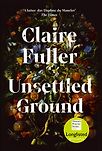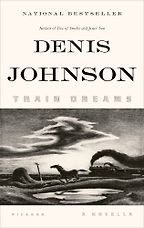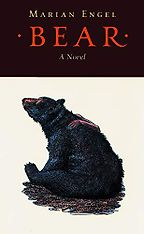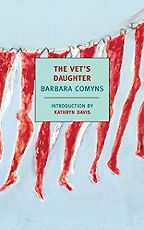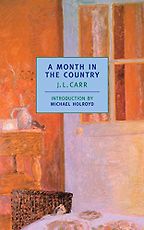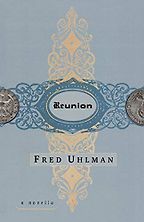Thank you for recommending to us five of the best novellas. A lot of readers have been telling us recently that their attention span is shot—so short, powerful books like these are really welcome. What do you enjoy about this form?
I don’t personally have an issue with attention span at the moment, but I know a lot of people do, so I can see that novellas would help with that. For me, as a reader, I think novellas are about being able to get into a story that is intense and engrossing—more so than a short story—but one that you can hold in your head all in one go, unlike a longer novel. All the novellas I’ve chosen you can read in two or three hours, so you don’t need to stop to go to sleep, to cook the dinner, to change a nappy or whatever else it is you have to do. The story can be sucked up all in one go, and that’s a wonderful thing.
Correct me if I’m wrong, but I think publishers are a bit leery of publishing novellas these days.
I think so. I think that’s because they worry that readers consider value for money when they buy a book. Perhaps publishers think it puts readers off because they aren’t getting a big, chunky tome that must have taken the author ten years to write and will take a couple of weeks to read. But actually, I’m sure novellas are just as hard to write as something longer. They are so intense but compact, so that every word has to count, and it’s about what is left out as much as what’s included. In this country—
—the UK, just to clarify for our international readers—
—I don’t think we celebrate them enough. We also don’t celebrate the short story as much as, say, in the States. So maybe that sentiment affects novellas as well in the UK.
The first book that you want to recommend is Dennis Johnson’s Train Dreams, which I discovered myself only recently after Dan Richards recommended it to me as one of the best examples of landscape writing. It’s a very elemental story. Why is this one of the best novellas?
Train Dreams is set in the American West at the start of the 20th century, and it’s about a man called Robert Grainier, a railroad worker. It’s his life, more or less from the beginning until the end, although it does jump around in time. The edition I have is only 116 pages—so he covers a whole life, and a huge amount of social change over that period, in a very short novel.
For me, the heart of this novella is a wildfire. Robert Grainier marries and has a daughter, and there is a terrible fire where his cabin burns downs, and he loses both of them. He has no choice but to continue with his life, but carries a huge amount of grief. Eventually he rebuilds his cabin on the site of the old one. And there’s this extraordinary scene which has never left me. I’m not sure if I should give spoilers?
Most of the books we discuss on Five Books have been out for a long time, so we’re very relaxed about that.
Okay, so Grainier believes his daughter is dead. But it turns out that—if what he’s seen is the truth and not simply what he longs to see—his daughter isn’t dead, but rather she has been taken and brought up by wolves. One night the pack comes to the cabin and she’s amongst them, and he sees that she has broken her leg, and he takes her into the cabin and puts it in a splint. She doesn’t recognise him and continues to behave like a wild animal and runs off. This scene affected me so much – that his daughter is alive but he can’t keep her. She has fundamentally changed. What happens to her is never known, and this is how Johnson manages to have so much in such a short novel: by letting the reader fill in the gaps. The whole novella is a masterpiece of intensity, despite it covering so many years.
“There’s this extraordinary scene which has never left me”
There are odd things, too. Grainier sees the world’s fattest man, and Elvis’s train. Then the last line is absolutely perfect. I wrote it down so that I wouldn’t forget it: “And that time was gone forever.” It sums the whole novella up, somehow.
Yes. I remember finishing it and feeling a bit staggered, as though coming back to life, and thinking—wow, was that just a few hours? It felt like a whole life had passed. It’s really something.
Absolutely.
I love this next recommendation: this is Bear by Marian Engel. I have to admit I was only familiar with this book thanks to a very funny internet meme that featured one of its very pulpy paperback covers and a caption to the effect of “Canada, wtf?” The plot is pretty wild!
Yes, it’s always been quite controversial! But also prize-winning. It won the Governor General’s Award in Canada in 1976 when it was published. It does have a real seventies vibe, I think, but I like that. It’s about Lou, a woman asked to catalogue a library in a house on a fairly remote Canadian island. She journeys there by boat, and the house is beautifully ornate. That’s the other thing about this novella—the house is so vivid. You think she’ll be travelling to a cabin, but it’s a house made of gold. Anyway, behind the house where she’ll live for the summer, is a bear.
“She said she meant no symbolism. It’s just, genuinely, that Lou takes a bear as her lover”
Lou knows nothing about animals. At first the bear is tied up on a chain, but she eventually gets to know him, and goes swimming with him, and then she invites him into the house, and they sit by the fire. The bear is described as a wild animal—Engel doesn’t anthropomorphise him—and then Lou begins a sexual relationship with this bear. Some readers are still shocked by this, if you look at Goodreads or other reviews. But I didn’t find the sexual scenes lurid, or gratuitous; I thought they were very well realised and completely part of the story. I actually found Lou’s relationship with the bear really moving. It all felt true—while still being odd to have sex with a bear.
But for me the novella is about Lou discovering herself and what she wants from life. By the end she realises she can be her own woman and make her own choices.
How do you think we should engage with this novella? It’s a lurid concept, but it’s played straight. Is it an allegory? Or do we just suspend disbelief and go along with it, take it at face value?
It feels completely possible. I went along with it utterly. There has been an awful lot of analysis about the metaphor and symbolism in this book. It was actually on school reading lists in Canada for a time, so it was widely discussed.
Engel herself said that she was ‘just typing.’ She was writing about a woman cataloguing a library, and she wanted to introduce a lover, and into her head popped a bear. She said she meant no symbolism, no metaphor by it at all. It’s just, genuinely, that Lou takes a bear as her lover. So all the analysis and symbolism Engel left completely for the readers, which is another thing I like. There’s an awful lot you could take from it: humans connecting with the wild, women having the sex or relationships of their choice… it can be taken in all sorts of ways, or it can be read straight.
That’s an interesting point, what you said about leaving it to the reader. It echoes a point made by the writers Sally Rooney and Naoise Dolan recently, this idea that once a book is finished and finds an audience, it no longer belongs to the writer. That the author’s intention, in other words, doesn’t really matter: the reader’s interpretation is as valid.
I really believe that. In fact, my second novel, Swimming Lessons, is all about that. I created an ambiguous ending deliberately because books with ambiguous endings force the reader into deciding how to interpret them.
I think it is absolutely up to the reader, and once a book is published it is created over and over by each reader because each of us will read it differently. In my mind I have a very clear image of the house Lou visits, but if you were to read Bear, no matter how well Engel describes the house, it would look different in your mind. So, I’ve created the book in my head, but in yours Bear would be a slightly different book. If we were to talk about it, you’d remember different things to me. So in that way, readers create books, and I love that.
Third on our list of the best novellas is The Vet’s Daughter by Barbara Comyns. It’s published by Virago in the UK and was recently reissued by the New York Review of Books, who billed it as “an unexpected cross between Flannery O’Connor and Stephen King.” Does that sound right?
I’m not sure. Stephen King, to me, means horror. And though there are awful things that happen in The Vet’s Daughter, it’s not written like a horror novel. I’d say instead that there are echoes of Shirley Jackson, maybe, especially We Have Always Lived in the Castle.
Five Books interviews are expensive to produce. If you're enjoying this interview, please support us by donating a small amount.
Anyway, let me tell you what it’s about. The vet’s daughter is Alice and she lives with her father in Edwardian London. He’s a horrible man. He’s very cruel to her and to his wife, who is more or less bedridden. They have lots of animals in their house that he’s also cruel to, and he euthanises quite a few of them.
Alice longs for a different life. She longs for a husband, a baby, for lovely things. After her mother dies, her father brings a woman who is possibly his mistress, into the house. And Alice, at the same time, is abused by a man. After she escapes, at home that evening, she starts to levitate.
Wait, wait, wait.
This is where Comyns just throws in a curveball, you know? It’s like, what? This is also written completely straight.
So, Alice is thinking, ‘why am I above my bed levitating?’ but she doesn’t have an answer. She leaves London to become housekeeper to a woman who lives in a burnt house, levitates there some more, and eventually goes back to her father. Then he begins to take advantage of these strange powers to make some money. It all ends very badly. It’s quite fairytale-like. Comyns writes in a simplistic, beautiful way. Alice is a very naïve character and yet she is in control of what she wants by the end of the book, although she doesn’t quite get it.
How intriguing.
I really recommend it. Apparently Comyns came up with the idea when she was on honeymoon with her husband. And, just a weird fact, they were honeymooning in a cottage in Wales that had been lent to them by Kim Philby, the spy.
Well, sure! Next up on our list of the best novellas is A Month in the Country by J. L. Carr, which was shortlisted for the Booker Prize in 1980.
It’s a wonderful book. And it was made into a very good film starring Colin Firth.
So in this novella, the narrator, Birkin is looking back over many years to the summer of 1920, when he has just been discharged from the army after the First World War. He travels to Yorkshire where he has been hired to uncover a mural, which has been painted over in the church of Oxgodby.
He’s obviously suffering from the effects of war. He has a facial twitch and a stammer. He works in the church, sleeps in the bell chamber, and meets a man called Moon, who has been hired to search for a particular grave. Birkin is only meant to be there for a month, but the work takes longer than he thought, all summer. There he is uncovering pictures of suffering which are clearly an allegory for what he has been going through.
Apparently, the novella is quite autobiographical. Carr was born in Yorkshire, and it does often feel as though Carr is speaking through Birkin, but it’s still a very subtle and understated work. Overlaying the whole book is a feeling of deep nostalgia and regret.
I was interested in what you said about there being autobiographical elements. Autofiction is such a buzzword at the moment, but of course novelists have always used aspects of their own lives.
I’m sure all novelists must use aspects of their own lives. Even those writing science fiction set on a different world, a different planet will still be writing about relationships, about society. Writers might use memories that they change completely so that the people involved wouldn’t recognise themselves, but we’re all drawing to some extent on what we know, what has happened to us, or what we’ve learned from other people. Even if, when writing a character from different gender or race than your own, you’re still using elements of what’s happened in your own life, the way I think Carr does in A Month in the Country. I think everything that has happened in an author’s life gets composted and may be used again.
I think this brings us to your final novella recommendation, which is Reunion by Fred Uhlman. I love what the Guardian had to say about it: “an epic story briefly told, that can be read in about the same time as it takes to drink two martinis.” That sounds like a perfect evening to me.
Although I reckon the character in it would have preferred to drink a couple of tankards of beer.
It’s mostly set in 1932, in Stuttgart, and it’s about the friendship of two schoolboys. I think they’re about 13. Konradin and Hans. Konradin comes from an aristocratic German family and Hans is Jewish, so they are quite unlikely friends at first; both are loners at school, but they hook onto each other and share everything for a number of years.
As a reader, you know what’s coming, because it’s set in the 1930s. But that is so beautifully underplayed. Konradin is invited to Hans’ house to meet his Jewish family, but Konradin’s parents do not invite Hans back. You understand so much more than the characters, and Uhlman handles that wonderfully.
“As a reader, you know what’s coming. But that is so beautifully underplayed”
Many years later, Hans is in America and he’s sent a letter from his old school in Germany asking to help raise funds for a memorial to the boys from the school who died during the war. Enclosed is a book of all the students who died, and how they died. Hans reads through it, but he avoids looking for his old friend. But at the end of the novella Hans decides to see what happened to Konradin. He has some assumptions, the reader has assumptions, but the very last line—when Hans reads what happened to his friend—turns all that on its head. It’s very clever. Very well handled and not sentimental. Very simple, very sharp, beautiful.
Thank you. Just before we close, would you tell us a bit about your new novel Unsettled Ground, which is very newly out.
Yes. It’s set in rural Wiltshire and it’s about twins Jeanie and Julius who are 51 and still live with their mother in a cottage. They have a market garden, so they make some money from growing vegetables but they live in rural isolation, and money is hard to come by. It’s a struggle, but this is their world. At the start of the book, their mother Dot dies and Jeanie and Julius have to learn to navigate society.
Jeanie can barely read or write and they have very little access to technology, and have no transport. They’ve lived in this bubble for more than fifty years and now they face eviction. And all Jeanie wants is to get back to her cottage and the way of life she had with her brother.
It’s wonderful. And it has just been longlisted for the Women’s Prize for Fiction.
It has! I’m delighted. I also had one more thing to say about novellas!
Please, go ahead.
Well, apart from them being more engrossing than a short story, but more condensed than a novel, there’s also the possibility—although none of these five do it—of playing with language and structure, which is harder to do in a novel. In a novella, I think you can often get away with this. I’m thinking of Max Porter’s Grief is the Thing With Feathers and Jenny Offill’s Dept. of Speculation.
Two books that really blew my mind.
If you do what they do with a full length novel, I think readers might find it more difficult. So, you can have more experimental structures, because the ‘weight’ of the book is less likely to make it collapse in on itself.
Interview by Cal Flyn, Deputy Editor
March 29, 2021. Updated: January 21, 2025
Five Books aims to keep its book recommendations and interviews up to date. If you are the interviewee and would like to update your choice of books (or even just what you say about them) please email us at [email protected]

